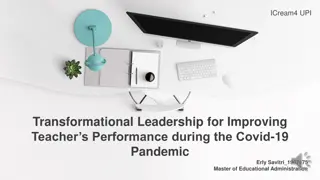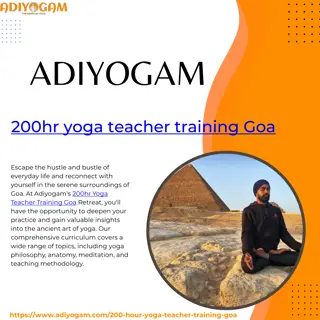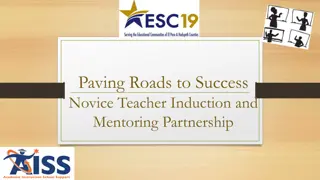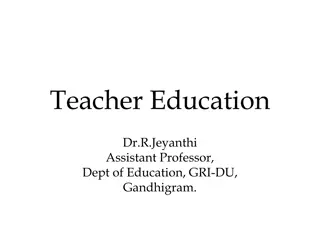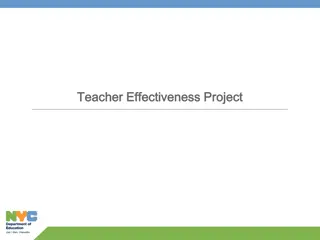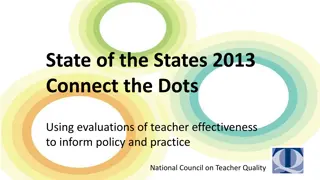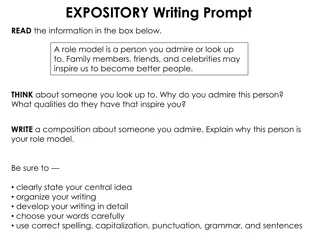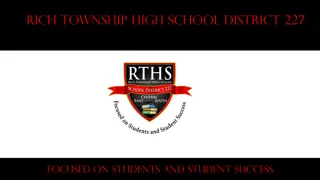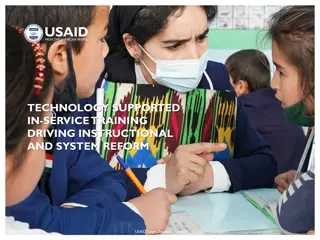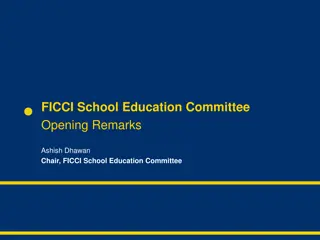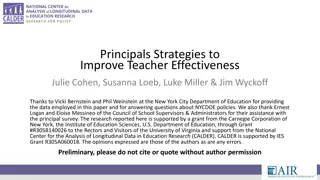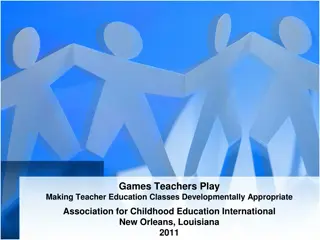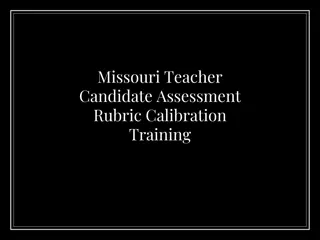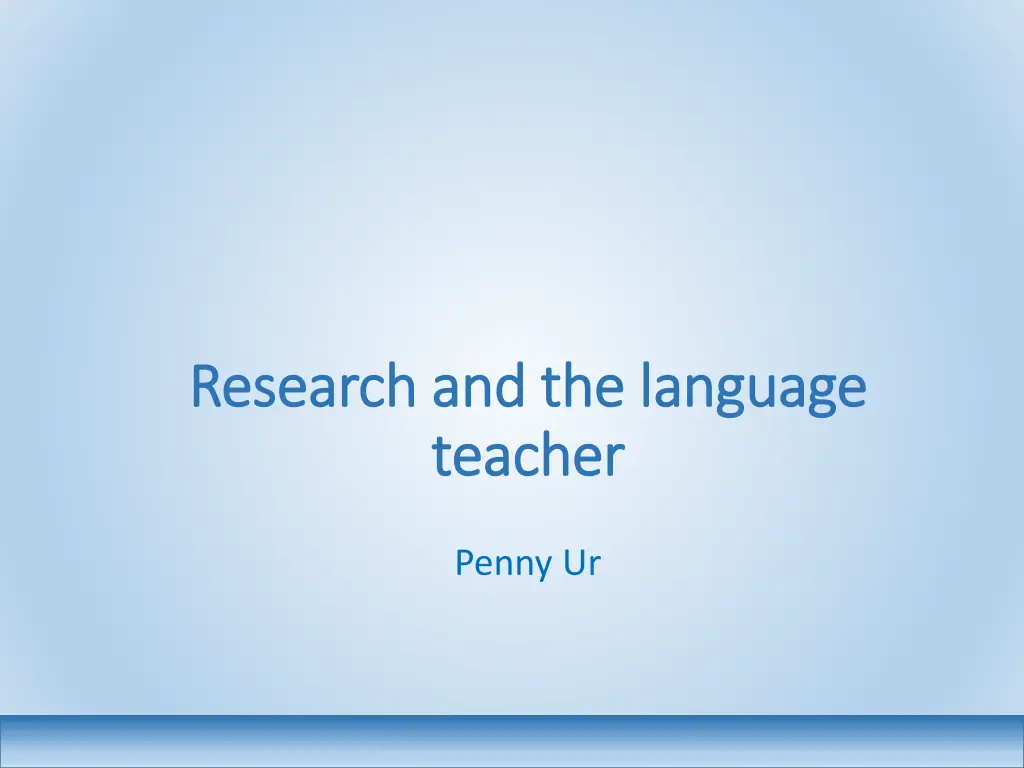
Teaching Profession and Research-Based Knowledge
Explore the importance of research in the teaching profession, the challenges teachers face in engaging with research literature, and the concept of teachers as researchers in the field of education. Discover the sources of teachers' knowledge and the significance of staying up-to-date with the latest academic research in education.
Download Presentation

Please find below an Image/Link to download the presentation.
The content on the website is provided AS IS for your information and personal use only. It may not be sold, licensed, or shared on other websites without obtaining consent from the author. If you encounter any issues during the download, it is possible that the publisher has removed the file from their server.
You are allowed to download the files provided on this website for personal or commercial use, subject to the condition that they are used lawfully. All files are the property of their respective owners.
The content on the website is provided AS IS for your information and personal use only. It may not be sold, licensed, or shared on other websites without obtaining consent from the author.
E N D
Presentation Transcript
Research and the language Research and the language teacher teacher Penny Ur
This session This session 1. Research as one component of the professional knowledge of the teacher 2. The contribution of research-based insights 3. The problems 4. Possible answers: selective and critical reading 5. The importance of mediators. 2
1. Research as one component of professional knowledge 3
Sources of teachers knowledge Sources of teachers knowledge Courses (pre- and in-service) Conferences Reading (research, professional literature) Recommendations of colleagues Feedback from students Classroom experience + reflection 4
Schn: The Reflective Practitioner Sch n: The Reflective Practitioner Professionals learn mainly by reflecting in/on action Not by applying research-based theories (Sch n, 1983) 5
Research Research- -based theory in teaching based theory in teaching The teaching profession, as with all high- standard professions, needs the best available academic knowledge in order to fulfil its commitments to society Teachers have to be familiar with the latest knowledge and research about the subject matter. (Niemi, 2008). 6
And the teachers themselves? And the teachers themselves? Most teachers do not read the research literature very often, if at all. Reasons: I don t have the time. I don t have access. It s not of practical help. It s difficult to understand. (Borg, S. 2009) 7
The teacher as researcher The teacher as researcher Lawrence Stenhouse (Hopkins & Rudduck, 1985) Research as disciplined enquiry made public Action Research But: it hasn t happened If it does, only within a supportive framework (course, external initiative) 8
Interim summary Interim summary Research-based theory is not seen by most teachers as the main contributor to professional knowledge. Teachers learn mainly from reflection on experience. Teachers do not usually do research themselves. But the importance of the research continues to be stressed in the professional literature. There is a trend towards academicization of the profession 9
Bottom line: dissonance Bottom line: dissonance An uncomfortable, unresolved discrepancy Rising awareness and increasing discussion in the literature and at conferences (Ellis, 2010, 2012; discussions in the research SIG at IATEFL, 2012) My position: research is not the main source of teacher knowledge, but it can enrich it. 10
2. The contribution of research- based insights 11
1. 1. Different types of research Different types of research- -based literature literature based 1. Original empirical research 2. Overviews / meta-analyses 3. Theory, drawing on research evidence 12
How does it contribute? How does it contribute? Research produces evidence, that can be used to create practical principles for teaching. May provide new insights / information that hadn t occurred to us May contradict comfortable, but inaccurate, assumptions May confirm our own intuitions 13
Example 1 Example 1 Guessing from context ( inferencing ) Convincing evidence that in over 50% of the cases, in natural contexts, unknown words cannot be guessed (Nassaji, 2003) Even if they are guessed correctly, this does not lead to better learning (Mondria, 2003) Guessing from context is no substitute for learning. It s probably better simply to explain, or gloss, new vocabulary in a text rather than asking students to guess. 14
Example 2: lexical sets Example 2: lexical sets Tinkham (1993) Does it help learners to master a new set of lexical items if they are all members of a lexical set (same part of speech, same kind of meaning: e.g. clothes, animals)? 15
Learners were presented with two sets of items from an Learners were presented with two sets of items from an artificial language, and told their meanings ; one set all artificial language, and told their meanings ; one set all related to the same domain, the other did related to the same domain, the other did not. not. shirt = moshee jacket = umau sweater = blaikel rain = moshee car = umau frog = blaikel rain = achen car = nalo frog = kawvas shirt = achen jacket = nalo sweater = kawvas 16
The The learners consistently learned the learners consistently learned the unrelated unrelated items better. items better. The research was later replicated, with similar results. e.g. Waring (1998), Papathanasiou (2009) When asked, learners said that they found they were confused because words had similar meanings. i.e. if you learn two words with similar meanings (or forms?) the learning of one interferes with learning the other. 17
But words linked to each other syntagmatically and thematically are learnt well. e.g. blue + sky rather than blue + red The vocabulary presented in elementary textbooks should be based not on semantic sets or pairs, but on thematic and syntactic links. e.g. if the theme is family then items might be things like: home, love, mother, father, kitchen, cook, marry, happy, comfortable... and not just a list of family members mother, father, brother, sister, aunt, uncle... 18
Example 3: Example 3: Corrective feedback Recasts are the least effective of oral corrective feedback strategies. (Lyster, 1998) When correcting we need to involve the student (elicitation, negotiation). 19
Problems 20
Why dont teachers read the research? Why don t teachers read the research? 1. Time! 2. Lack of clarity 3. Contradictions 4. Researcher bias 4. Practical application may be limited or inappropriate: i. Trivial or impractical topics ii. Small population, time-frame iii. The Hawthorne effect iv. Local pedagogical or practical constraints v. Inadequate professional experience of researcher 21
Time Time Teachers are busy: lessons, preparation, checking assignments, paperwork. Reading and study are not built in to the teachers work description. Sometimes actively discouraged by employers. 22
Lack of clarity Lack of clarity Sometimes inevitable: specific terminology, statistics Often unnecessary (and unforgivable!): difficult language for its own sake (Aaronson, 1977) 23
Contradictions Contradictions Example: The role of practice in instructed language learning Salaberry(1997) vs. Ellis (2001) 24
Researcher bias Researcher bias Articles which use the research to support a particular position Examples: Truscott (1999): Against the giving of corrective feedback Swan (2005): Against task-based instruction 25
Limited practical application Limited practical application (i) Trivial, irrelevant or impractical (i) Trivial, irrelevant or impractical Studies on problems with a particular grammatical point. Studies on topics that aren t relevant to our context (e.g. CLIL) Studies that draw conclusions that can t be implemented in practice (e.g. teachability hypothesis) 26
Limited practical application Limited practical application (ii) Small population or time (ii) Small population or time- -frame frame Small populations: usually university students Relatively short time Example: Studies quoted in Norris & Ortega (2001) 27
Limited practical application Limited practical application (iii) The Hawthorne effect (iii) The Hawthorne effect Impressive results in an empirical study may be simply the result of change, and subjects awareness that this is an experimental innovation. e.g. Research on the use of CALL (Macaro, Handley, & Walter, 2012) 28
4. Limited practical application 4. Limited practical application (iv) Pedagogical / practical constraints (iv) Pedagogical / practical constraints The published research on ELT is nearly all second language acquisition (SLA). But practical pedagogical issues are often more important to practitioners: large and/or heterogeneous classes discipline problems pressure from stakeholders upcoming exams the local culture of learning limited time to prepare etc. 29
Example 1: Culture of learning Example 1: Culture of learning Task-based or communicative teaching The task-based approach seen by many as the best basis for successful instructed language-learning But not appropriate for some cultures of learning (Carless, 2007; Hu, 2002) 30
Example 2: stakeholder pressure Example 2: stakeholder pressure The optimal age for starting to study English in school In the context of instructed language learning, late starters learn better. (Mu oz & Singleton, 2011) But the pressure of parents, politicians and commercial interests leads to early-start programs. 31
(iv) Inadequate professional knowledge of (iv) Inadequate professional knowledge of researcher researcher The rearcher s practical pedagogical implications are often in fact impractical. Many excellent studies are followed by off the wall suggestions for classroom teaching. Practical application of research to teaching has to be determined by the teacher (Widdowson, 1990; Ellis, 2012). 32
Main problems: time, access, practical Main problems: time, access, practical use, comprehensibility. use, comprehensibility. Time and access: the contribution of the Internet Access: national and international conferences Practical use, comprehensibility: the need for selective, critical reading. 34
Selective reading Selective reading Check the topic: look it up on the Internet Check the source: a respected publisher or journal Check the author Websites, e.g. http://www.tesolacademic.org/ Webinars, conference proceedings, Youtube 35
Critical reading Critical reading Check for clarity Check for replications / contradictions Check for applicability to your teaching Draw your own conclusions 36
4. Mediators 37
Who are the mediators? Who are the mediators? Mediators : Teachers who are also trainers, readers of research and perhaps writers: can mediate the research literature for other teachers. 38
Types of mediators Types of mediators Speakers at conferences presenting their own interpretations of research Writers of teacher handbooks Teacher trainers or counselors. 39
The research component in teacher The research component in teacher courses courses It is important to include insights from the research in teacher courses (whether preparation or ) But why, if it s not a major source of teacher expertise. 40
The reasons The reasons 1. It s not a major source, but it is a significant one, not available from daily practice. 2. Teachers rarely, if ever, have opportunities to encounter it elsewhere. 3. The trainer is in a position to mediate the research. 41
What is mediation in this case? What is mediation in this case? 1. Selection. The trainer selects for inclusion research studies that present reliable evidence, and that have clear implications for teaching/learning. 2. Clarification. The trainer presents / explains the studies, rather than leaving teachers to read on their own. 3. Criticism. The trainer leads discussion of the implications of the research for teaching, including reservations and criticism. 42
Summary Summary The research literature is an important source of professional knowledge. There is too much of it, and a lot of it is impractical or difficult to read. It should be read selectively and critically. Hence the need for mediators: chiefly the teacher trainers. (Ur, 2014) 43
References References Aaronson, S. (1977-8). Style in scientific writing. Essays of an Information Scientist, 3, 4- 13. Available from: http://www.garfield.library.upenn.edu/essays/v3p004y1977-78.pdf Borg, S. (2009). English language teachers conceptions of research. Applied Linguistics, 30(3), 358 388. Carless, D. (2007). The suitability of task-based approaches for secondary schools: Perspectives from Hong Kong. System, 35(4), 595-608. Ellis, R. (2001). Grammar teaching - Practice or consciousness-raising? In Richards, J. C. & Renandya, W. A. (Eds.), Methodology in language teaching (pp.167-174). Cambridge: Cambridge University Press. Ellis, R. (2010). Second language acquisition, teacher education and language pedagogy. Language Teaching, 43(2), 182-201. Ellis, R. (2012). Language teaching research and language pedagogy. Chichester, Uk: Wiley-Blackwell. Hopkins D., & Rudduck J. (Eds.) (1985). Research as a basis for teaching: Readings from the work of Lawrence Stenhouse. London: Heinemann. Hu, G . (2002). Potential cultural resistance to pedagogical imports: the case of communicative language teaching in China. Language, Culture and Curriculum, 15(2), 93- 105. 44
Lyster, R. (1998). Negotiation of form, recasts and explicit correction in relation to error types and learner repair in immersion classrooms. Language Learning, 48(2), 183-218. Macaro, E, Handley, C., & Walter, C. (2012). A systematic review of CALL in English as a second language: Focus on primary and secondary education. Language Teaching, 45, 1-43. Mondria, J- A. (2003). The effects of inferring, verifying and memorizing on the retention of L2 word meanings. Studies in Second Language Acquisition, 25(4), 473- 499. Mu oz, C., & Singleton, D. (2011). A critical review of age-related research on L2 ultimate attainment. Language Teaching, 44(1), 1-35. Nassaji, H. (2003). L2 vocabulary learning from context: Strategies, knowledge sources and their relationship with success in L2 lexical inferencing. TESOL Quarterly, 37(4), 645-670. Niemi, H. (2008). Advancing research into and during teacher education. In Hudson, B. & Zgaga P. (eds) Teacher education policy in Europe (p.184). Faculty of Teacher Education, University of Ume , in co-operation with the Centre for Educational Policy Studies, Faculty of Education, University of Ljubljana Norris, J. M., & Ortega, L. (2001). Does type of instruction make a difference? Substantive findings from a meta-analytic review. Language Learning, 51, Supplement 1, 157-213. Papathanasiou, E. (2009). An investigation of two ways of presenting vocabulary. ELT Journal, 63(4), 313-322. Salaberry, M. R. (1997). The Role of Input and Output Practice in Second Language Acquisition. Canadian Modern Language Review, 53(2), 422-451. 45
Schn, D. A. (1983). The Reflective Practitioner. New York: Basic Books. Swan, M. (2005). Legislation by hypothesis: the case of task-based instruction. Applied Linguistics, 26(3), 376-401. Tinkham, T. 1993. The effect of semantic clustering on the learning of L2 vocabulary. System 21(3): 371-80. Truscott, J. (1999). What's wrong with oral grammar correction? The Canadian Modern Language Review, 55(4), 437-56. Ur, P. (2014). Practice and research-based theory in English teacher development. European Journal of Applied Linguistics and TEFL, 3(2), 143-156. Waring, R. 1998. The negative effect of learning words in semantic sets: a replication. System 25(2), 261-74. Widdowson, H. G. (1990). Aspects of language teaching. Oxford: Oxford University Press. 46
Useful Resources Useful Resources Journals The Reading Teacher Educational Leadership English Teaching Professional ELT Journal English Teaching Forum The Modern Language Journal Modern English Teacher Blogs http://leoxicon.blogspot.co.il/ http://elt-resourceful.com/ https://janecohenefl.edublogs.org/ 47


